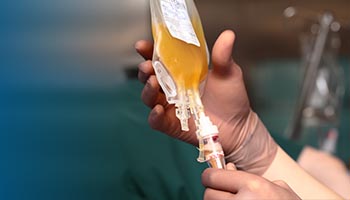HOW CAN WE HELP YOU? Call 1-800-TRY-CHOP
In This Section
Convalescent Plasma for Pediatric Patients With SARS-CoV-2

Convalescent plasma has potential as a treatment for pediatric patients with COVID-19.
The Findings:
Researchers presented the first report of pediatric patients treated with convalescent plasma (CP) for life-threatening COVID-19 associated acute respiratory distress syndrome. CP is derived from patients who have recovered from COVID-19 and can be administered in currently ill patients to generate an antibody response that renders the virus inert.
Children’s Hospital of Philadelphia physicians safely administered CP to four pediatric patients with severe COVID‐19 with no CP‐related treatment‐emergent adverse events (TEAE). The theoretical risks of antibody-dependent enhancement, in which antibodies developed during a previous infection can cause a worsened clinical response in subsequent infection, did not occur.
In three patients, the serum levels of SARS‐CoV‐2–specific antibodies eventually surpassed the amount transfused, indicating CP did not eliminate the endogenous serological response. The research suggests CP may hold the greatest benefit for patients early in their illness who have not yet generated endogenous antibodies, and when the infused plasma has a high antibody titer.
The small sample size of this study prevents broad conclusions about effectiveness, although the patient who received CP with the highest antibody titer had the best clinical response and was discharged home after being on extra-corporeal membrane oxygenation. The patient’s total antibody response mounted did not differ markedly from the other patients.
Why it matters:
While early reports from the SARS‐CoV‐2 pandemic suggested that children were less severely affected by COVID-19 compared to older adults, some children do become critically ill. Currently, no proven therapies are available to treat pediatric patients who develop life-threatening complications related to SARS-CoV-2. A series of cases of CP use in adults with COVID-19 demonstrated potential benefits without apparent side effects, but there are no other known reports of treatment with CP for pediatric patients.
Who conducted the study:
David Teachey, MD, attending physician, co-leader of the Immune Dysregulation Frontier Program, and director of clinical research at the Center for Childhood Cancer Research at CHOP is the senior author of the study. Among the additional contributors to this work are Deborah Sesok-Pizzini, MD, MBA, medical director of Blood Bank and Transfusion Medicine; Edward Behrens, MD, chief, Division of Rheumatology and co-leader, Immune Dysregulation Frontier Program; Kathleen Chiotos, MD, Pediatric Sepsis Program; and Hamid Bassiri, MD, PhD, in the Division of Infectious Diseases; all of whom hold faculty positions at the Perelman School of Medicine at the University of Pennsylvania, as well as first author Caroline Diorio, MD, FRCPC, FAAP, fellow with the Cancer Center at CHOP.
How they did it:
CHOP physicians treated four critically ill children infected with SARS-CoV-2 with CP at CHOP, utilizing emergency Investigational New Drug applications from the Food and Drug Administration for cases of life-threatening disease. The team measured antibody levels in the donated plasma, and they measured recipients’ antibody levels before and after CP infusion. All participating patients had COVID‐19‐associated acute respiratory distress syndrome, requiring intubation, ventilation, or extracorporeal membrane oxygenation. Each of the patients received other SARS‐CoV‐2‐directed therapies in addition to CP.
Quick thoughts:
“The small sample size of our study precludes definitive conclusions about efficacy, however, the excellent clinical response in this [one] patient is encouraging,” the study authors summarized. “The other patients had significant comorbidities that may have contributed to their clinical status.”
What's next:
Randomized controlled clinical trials are necessary to evaluate the efficacy of using convalescent plasma in pediatric patients as a treatment of SARS-CoV-2.
Where the study was published:
Where to learn more:
Read the CHOP press release about the current study, and our Cornerstone interview with Dr. Teachey when the research was in process.


